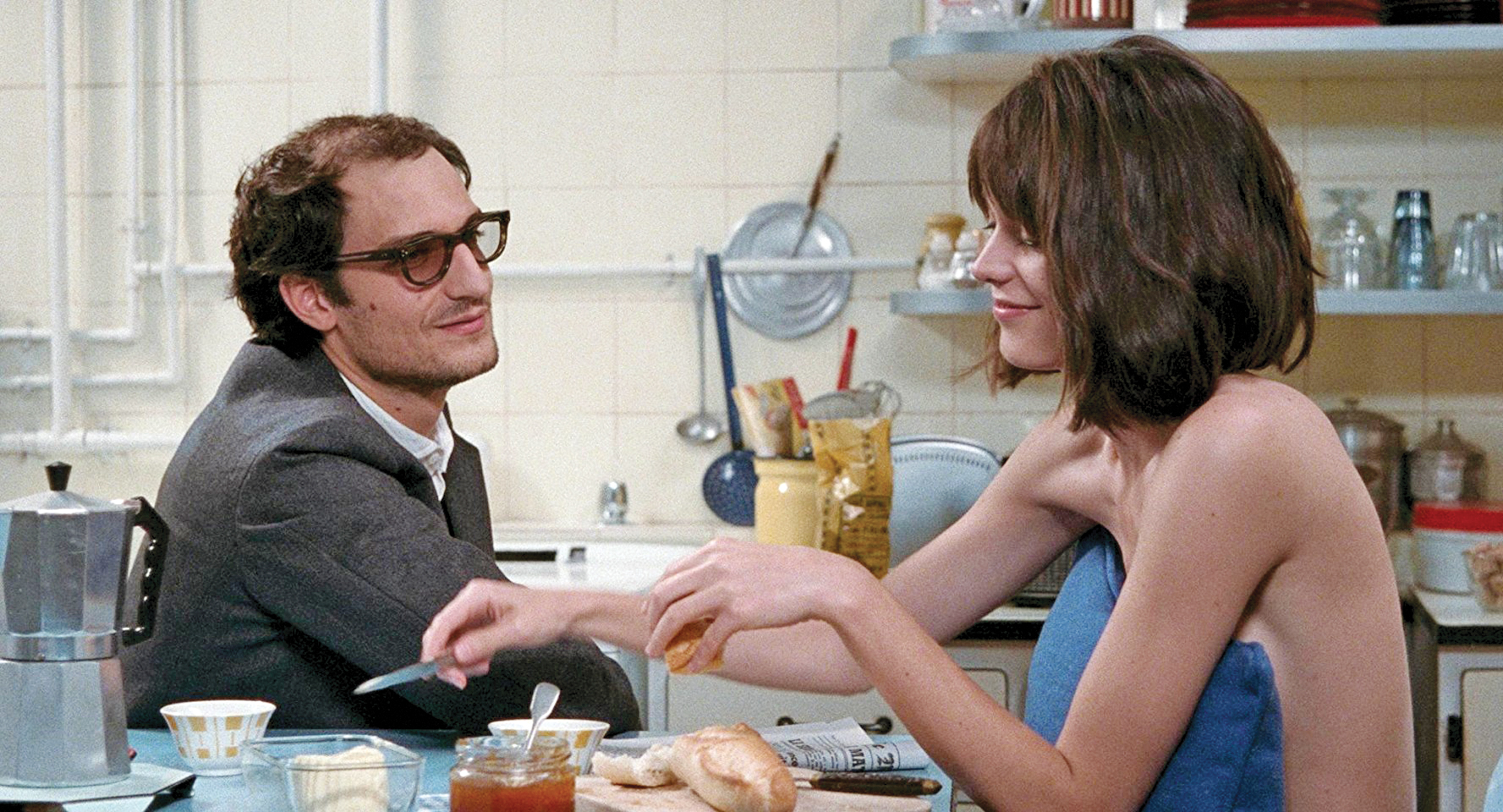In 1941, Preston Sturges wrote and directed a movie called Sullivan’s Travels about a successful director of cinematic fluff who longs to make a serious artistic statement called O Brother, Where Art Thou? “I want this picture to be a commentary on modern conditions!” he tells the head of his studio. “But with a little sex,” the studio chief cautions. For complicated reasons, Sullivan ends up a falsely convicted felon working on a chain gang. One night he and his fellow convicts are allowed to see a Mickey Mouse short. He watches as they howl with joy and learns at that moment the great value of his supposedly trivial work. “There’s a lot to be said for making people laugh,” Sullivan concludes. “Did you know that’s all some people have?”
The French writer-director Michel Hazanavicius, who won an Oscar for The Artist in 2011, has just come out with an astonishingly nervy update of Sturges’s indelibly wonderful film. It’s called Godard Mon Amour, and it is nothing less than a Sullivan’s Travels in which nihilistic Maoism takes the place of Depression-era poverty. Its subject is the writer-director Jean-Luc Godard, who was arguably the most celebrated filmmaker in the world in the 1960s.
Unlike his rivals for international fame—Ingmar Bergman, Federico Fellini, and François Truffaut—Godard combined radical techniques in cinematic storytelling with the unutterably tiresome Gallic propensity for expressing deep existential dilemmas in endless multisyllabic chatter. Then he threw in épater-les-bourgeois critiques of capitalism and democracy. A heartthrob was born.
Hazanavicius has taken an autobiographical novel by Godard’s second wife Anne Wiazemsky and turned it into a satirical disembowelment of Godard as a man and an artist—using Godard’s own inventive style to mock him. We see Godard (played by Louis Garrel) get into a fistfight with an advertising man at a Paris cocktail party, but one of the movie’s most devastating points is that every fresh trick Godard brought to the screen simply became another tool in the Madison Avenue TV-commercial arsenal.
Godard Mon Amour is the story of how Godard’s restless and dissatisfied spirit could not find meaning in the fact that he was making movies people adored—or the fact that he had an adoring and adorable wife who was devoted to him. Instead, he turned to the violent revolutionary rhetoric of Maoism to find new purpose. In Hazanavicius’s telling, this ended Godard’s life as an artist and turned him into a person impossible to love or even like. Godard is a comic character here whose involvement in demonstrations inevitably ends with him getting his glasses broken—something that really happened repeatedly to Godard, according to his biographer Colin MacCabe.

Still an idol at 87, Godard is enraged by the movie, and fanboy film critics around the world have been clucking their tongues with Mrs. Grundy-like disapproval at Hazanavicius’s biting reduction. “This version of Godard must choose between cinema and politics, a predicament that would be more credible if Mr. Hazanavicius had a credible conception of either term,” writes a deeply disapproving A. O. Scott in the New York Times. In the New Yorker, Richard Brody tut-tuts that Hazanavicius “toys with their lives as if seeking to dominate them, to vampirize their experience, their talent, and even their status—all of which lies in stark contrast with the self-revealing, self-deprecating, confessional power of Godard’s films.”
Their pomposity exposes their folly. First, since when does anyone need a “credible conception” of the “cinema”? And contra Brody, Godard’s films demonstrate nothing if not their maker’s self-regard—an amour-propre that goes beyond anything else in the history of “cinema.” (Oh, and by the way: Colin MacCabe is Godard’s greatest admirer but notes nonetheless that Godard’s standing as a thinker is compromised in part by the fact that his “reading often stopped at the table of contents.”)
It is risible to see a man whose entire career was built on supposedly revolutionary impiety become a plaster saint. As one of the founders of the so-called New Wave, Godard rose to prominence declaring that the classically stately style of French cinema was an artistic mausoleum. But when it comes to impiety, it turns out that Godard has nothing on Michel Hazanavicius, whose movie playfully but systematically deflates the pretensions of a supposedly Great Man—and whose previous work offered no hint he possessed this kind of cold-eyed satirical bravery.
Perhaps Hazanavicius’s disgust with Godard stems in part from Godard’s stomach-churning anti-Semitism. He includes a scene in which Godard stands during the May 1968 student uprising and tries inarticulately to formulate a theory about how the Jews have now become the Nazis. The kids in the room squint in disbelief (this is probably retroactive wish fulfillment on Hazanavicius’s part) while his wife (the enchanting Stacy Martin) rolls her eyes in exasperated frustration. Godard Mon Amour is an amazing piece of work that says a man who became world-famous by declaring that the emperor had no clothes . . . himself had no clothes. It’s Sullivan’s Travels in which Sullivan doesn’t learn a damned thing.
